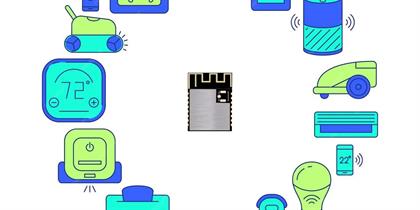
The Evolution of BLE Beacons: A Beacon of Progress in Bluetooth Technology
September 23, 2024

In the ever-expanding universe of wireless communication, Bluetooth technology has evolved from a simple wireless alternative to cables into a sophisticated enabler of IoT solutions. A significant milestone in this evolution is the emergence of Bluetooth Low Energy (BLE Beacon) beacons. These tiny devices have transformed the way we think about proximity, connectivity, and data exchange. This article explores the journey of BLE beacons, from their inception to the cutting-edge applications that are shaping the future of IoT.
The Birth of BLE Beacons
The story of BLE beacons begins with the introduction of BLE technology, which offered a new paradigm of wireless communication characterized by low power consumption and high efficiency. BLE beacons, initially developed as a part of Apple’s iBeacon in 2013, were designed to leverage the BLE protocol to broadcast signals to nearby devices, paving the way for a new era of proximity-based services.
The Evolution of BLE Technology
As BLE technology matured, so did the capabilities of beacons. The Bluetooth Special Interest Group (SIG), the governing body for Bluetooth standards, has played a crucial role in shaping the evolution of beacons. With each new version of Bluetooth, the range, data capacity, and security of beacons have improved, making them more versatile and reliable.
The Role of BLE Beacons in IoT
BLE beacons have become integral to IoT applications, serving as the eyes and ears of smart environments. They facilitate asset tracking, indoor navigation, customer engagement, and data collection. The ability of beacons to interact with smartphones and other BLE devices has opened up a world of possibilities for enhancing user experiences and optimizing operations.
Enhancements in Beacon Capabilities
Over time, the capabilities of BLE beacons have expanded. They now support more sophisticated data transmission, allowing for the exchange of more complex information. Beacons can now transmit not just basic identifiers but also contextual data, such as temperature, humidity, and even user preferences, enriching the interaction between devices and users.
The Impact of BLE 5 and Beyond
The introduction of Bluetooth 5 brought significant improvements to beacon technology. With its longer range, faster data transmission rates, and increased broadcasting capacity, Bluetooth 5 has made beacons more powerful and efficient. The upcoming Bluetooth 5.3 version promises even more enhancements, including improved precision and security, which will further bolster the role of beacons in IoT.
Security Advancements
As beacons became more prevalent, so did the need for robust security. BLE beacons now incorporate advanced encryption standards to protect data integrity and user privacy. Features like the Temporary Key Service (TKS) in Bluetooth 5.3 are designed to provide secure communication without the need for device pairing, ensuring that data exchange remains safe and private.
Integration with Other Technologies
BLE beacons are not operating in isolation. They are increasingly being integrated with other technologies, such as Wi-Fi, NFC, and cellular networks, to create hybrid solutions that offer greater flexibility and coverage. This integration is enabling more comprehensive IoT systems that can leverage the strengths of multiple communication protocols.
The Future of BLE Beacons
The future of BLE beacons is bright, with ongoing research and development aimed at enhancing their capabilities. We can expect to see beacons with even lower power consumption, more advanced data processing capabilities, and integration with AI and machine learning algorithms for predictive analytics and automated decision-making.
Conclusion
The evolution of BLE beacons is a testament to the dynamic nature of Bluetooth technology and its ability to adapt and innovate. From their humble beginnings as simple proximity markers, beacons have grown into powerful tools that are transforming the IoT landscape. As Bluetooth technology continues to advance, so too will the potential of beacons, promising a future where connectivity is seamless, intelligent, and ubiquitous.
You Might Like Also

In the quest for cleaner and healthier indoor air, Bluetooth modules have become an integral part of modern air purifiers. These compact devices enable wireless communication between the air purifier and other systems, such as smartphones or home automation networks. By integrating Bluetooth technology, air purifiers can offer a range of advanced f Read More

In the modern landscape of wireless technology, Bluetooth modules have become indispensable components, enabling a myriad of applications that enhance our daily lives. These compact devices, embedded within a wide array of products, facilitate communication and connectivity with minimal effort. This article delves into the diverse applications of B Read More

The Versatility of Bluetooth Modules: Unleashing Connectivity
In the realm of wireless communication, Bluetooth modules have emerged as the Swiss Army knife of connectivity, enabling seamless interaction between devices over short distances. These compact devices have become indispensable in a variety of applications, from consumer electronics to industrial automation. Bluetooth modules are the silent workhor Read More

Enriching the Museum Experience: The Role of Bluetooth Beacons
Bluetooth Beacons are wireless transmitters that can detect the presence of mobile devices within their vicinity. In a museum setting, beacons can be placed at various exhibits to provide a wealth of information and interactive content to visitors. As a visitor approaches an exhibit, their device can receive a signal from the beacon, triggering an Read More

Bluetooth beacon used in Indoor Positioning Systems
Bluetooth beacons have become an essential component in Indoor Positioning Systems (IPS), providing accurate location data that enhances various applications within controlled environments. In smart retail settings, beacons play a crucial role in enhancing customer experiences, optimizing store operations, and driving business insights. Read More

The role of Bluetooth beacons in RTLS
Bluetooth beacons are playing an increasingly vital role in Real-Time Locating Systems (RTLS), particularly within the context of warehouse management. These tiny, yet powerful devices, are redefining the way warehouses operate, offering a new level of efficiency and precision that is transforming inventory tracking and asset management. Read More











